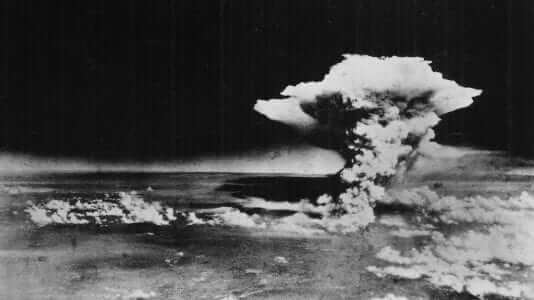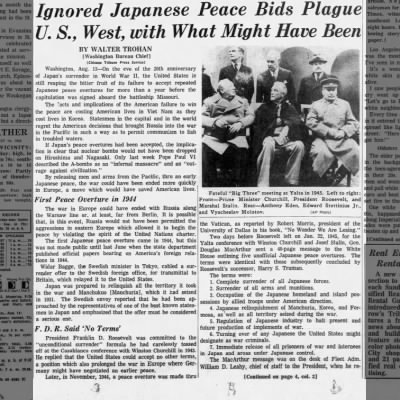2aguy
Diamond Member
- Jul 19, 2014
- 111,975
- 52,247
- 2,290
I hold THE UNITED STATES OF AMERICA to a higher standard than you seem to.
We ended the war and saved lots of lives doing it..........
Follow along with the video below to see how to install our site as a web app on your home screen.

Note: This feature currently requires accessing the site using the built-in Safari browser.
I hold THE UNITED STATES OF AMERICA to a higher standard than you seem to.
Again, someone doesn't seem to think very much of THE UNITED STATES OF AMERICA, which I hold to a higher standard than our enemies during wartime. Do you wish we had thrown Germans into ovens after winning the war in Europe? I think we'd a lot better than that. I guess you don't.
The war was already won, and we incinerated hundreds of thousands of starving women, children, and the elderly just to try out a new "toy" for fdr's legacy.We ended the war and saved lots of lives doing it..........
The war wasn't won. The Japanese were still fighting, still killing our POWs, still killing thousands of Chinese, Burmese and Malaysian civilians every day, still launching kamikaze attacks, still torpedoing our ships. For your information, the USS Indianapolis was sunk by a Japanese submarine during this time. Wars aren't over until one side or the other acknowledges defeat and the Japanese were far from defeated in their minds. Look at teh "peace" proposals they tendered through the Swedes. Nothing more substantive than a return to status quo ante December 6th 1941.The war was already won, and we incinerated hundreds of thousands of starving women, children, and the elderly just to try out a new "toy" for fdr's legacy.
The war wasn't won. ...
Disgraceful post. And beyond just wrong. It’s brain dead and anti-Semitic.In a war FDR and his jewish advisers got us into. World would be a much better place today had Hitler won and the Jew lost.
."
HERBERT HOOVER
"On May 28, 1945, Hoover visited President Truman and suggested a way to end the Pacific war quickly: "I am convinced that if you, as President, will make a shortwave broadcast to the people of Japan - tell them they can have their Emperor if they surrender, that it will not mean unconditional surrender except for the militarists - you'll get a peace in Japan - you'll have both wars over."
Richard Norton Smith, An Uncommon Man: The Triumph of Herbert Hoover, pg. 347.
On August 8, 1945, after the atomic bombing of Hiroshima, Hoover wrote to Army and Navy Journal publisher Colonel John Callan O'Laughlin, "The use of the atomic bomb, with its indiscriminate killing of women and children, revolts my soul."
quoted from Gar Alperovitz, The Decision to Use the Atomic Bomb, pg. 635.
"...the Japanese were prepared to negotiate all the way from February 1945...up to and before the time the atomic bombs were dropped; ...if such leads had been followed up, there would have been no occasion to drop the [atomic] bombs."
- quoted by Barton Bernstein in Philip Nobile, ed., Judgment at the Smithsonian, pg. 142
Hoover biographer Richard Norton Smith has written: "Use of the bomb had besmirched America's reputation, he [Hoover] told friends. It ought to have been described in graphic terms before being flung out into the sky over Japan."
Richard Norton Smith, An Uncommon Man: The Triumph of Herbert Hoover, pg. 349-350.
In early May of 1946 Hoover met with General Douglas MacArthur. Hoover recorded in his diary, "I told MacArthur of my memorandum of mid-May 1945 to Truman, that peace could be had with Japan by which our major objectives would be accomplished. MacArthur said that was correct and that we would have avoided all of the losses, the Atomic bomb, and the entry of Russia into Manchuria."
And the bomber mafia was saying Japan was defeated by bomber raids. The only people looking at the real situation on the ground were the grunts. A lot of flag officers had ethics issues with nukes, oddly enough they had no ethical issues with starving an entire race to death, or incinerating millions by firebombing attacks or even killing tens of thousands by random naval gunfire. Leahy never saw combat, he was a staff puke ivy tower flag officer who never made a life or death decision in his entire career. He retired in 1939 and as a close friend of FDR got recalled to first serve as ambassador to Vichy France until 1942, then FDR drafted him as what amounted to the White House Chief of Staff. He, like Doug MacArthur, were products of an earlier age who thought warfare could be fought like knights in armor.ADMIRAL WILLIAM D. LEAHY
(Chief of Staff to Presidents Franklin Roosevelt and Harry Truman)
"It is my opinion that the use of this barbarous weapon at Hiroshima and Nagasaki was of no material assistance in our war against Japan. The Japanese were already defeated and ready to surrender because of the effective sea blockade and the successful bombing with conventional weapons.
"The lethal possibilities of atomic warfare in the future are frightening. My own feeling was that in being the first to use it, we had adopted an ethical standard common to the barbarians of the Dark Ages. I was not taught to make war in that fashion, and wars cannot be won by destroying women and children."
Hiroshima: Quotes
Quotes from prominent Americans on why the atomic bombing of Japan was probably wrong.www.doug-long.com
The Japanese government knew they could surrender at any time. They refused. Hoover’s idea was beyond ludicrous, the Japanese people had no voice in their government. Japan was essentially governed as a feudal state by the military, even the Mikado was mostly a rubber stamp for the decisions reached by the military. Surrendering was the first independent action ever taken by Hirohito."
HERBERT HOOVER
"On May 28, 1945, Hoover visited President Truman and suggested a way to end the Pacific war quickly: "I am convinced that if you, as President, will make a shortwave broadcast to the people of Japan - tell them they can have their Emperor if they surrender, that it will not mean unconditional surrender except for the militarists - you'll get a peace in Japan - you'll have both wars over."
Richard Norton Smith, An Uncommon Man: The Triumph of Herbert Hoover, pg. 347.
On August 8, 1945, after the atomic bombing of Hiroshima, Hoover wrote to Army and Navy Journal publisher Colonel John Callan O'Laughlin, "The use of the atomic bomb, with its indiscriminate killing of women and children, revolts my soul."
quoted from Gar Alperovitz, The Decision to Use the Atomic Bomb, pg. 635.
"...the Japanese were prepared to negotiate all the way from February 1945...up to and before the time the atomic bombs were dropped; ...if such leads had been followed up, there would have been no occasion to drop the [atomic] bombs."
- quoted by Barton Bernstein in Philip Nobile, ed., Judgment at the Smithsonian, pg. 142
Hoover biographer Richard Norton Smith has written: "Use of the bomb had besmirched America's reputation, he [Hoover] told friends. It ought to have been described in graphic terms before being flung out into the sky over Japan."
Richard Norton Smith, An Uncommon Man: The Triumph of Herbert Hoover, pg. 349-350.
In early May of 1946 Hoover met with General Douglas MacArthur. Hoover recorded in his diary, "I told MacArthur of my memorandum of mid-May 1945 to Truman, that peace could be had with Japan by which our major objectives would be accomplished. MacArthur said that was correct and that we would have avoided all of the losses, the Atomic bomb, and the entry of Russia into Manchuria."
The war was already won, and we incinerated hundreds of thousands of starving women, children, and the elderly just to try out a new "toy" for fdr's legacy.


 nsarchive.gwu.edu
nsarchive.gwu.edu


We also killed more Japs with conventional bombs than we did with nuclear. More died in the fire bombings than both nukes combined.Yeah......as General May pointed out, he killed more Germans with conventional bombs than we did to the Japanese with the atomic bomb